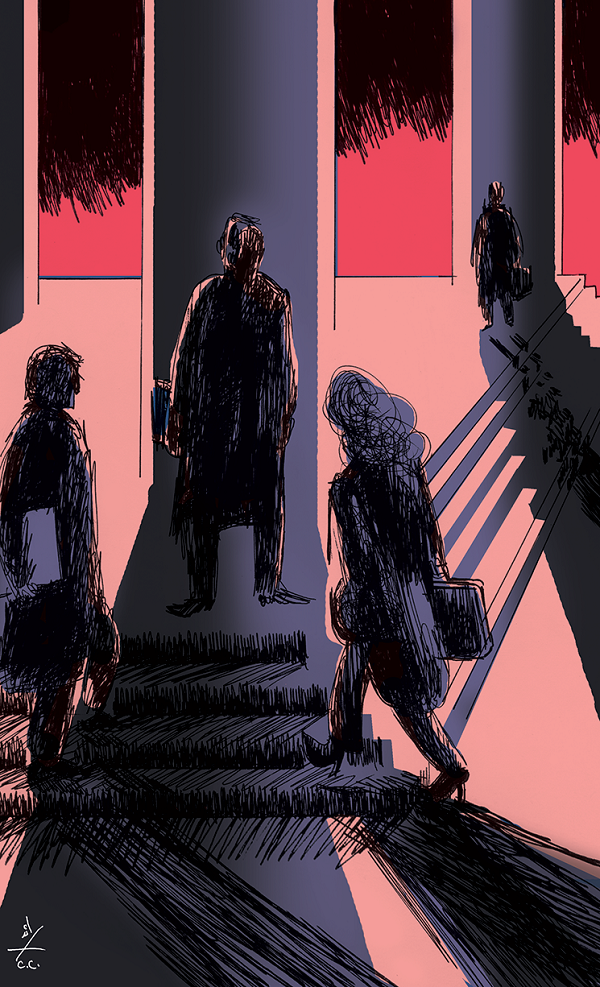Lebanon’s State Council: Guaranteeing Independence with a Non-Independent Authority?

Every judicial body in Lebanon has an authority tasked with ensuring its independence and proper functioning. For the administrative judiciary, that authority is the State Council Bureau (hereinafter “the Bureau”), which parallels the Supreme Judicial Council in the judicial judiciary.[1] The basic idea behind this arrangement is the need for a public authority independent of the executive branch to take charge – to one extent or another – of appointing judges and managing their careers as a fundamental safeguard of judicial independence. Guaranteeing the judiciary’s independence remains a very difficult and delicate matter that usually requires a heightened sense of independence and constant readiness to go as far as confronting very influential forces that regularly strive to acquire positions within the judiciary or at least win certain cases. What rules are adopted to enable the Bureau to perform this momentous task? More specifically, what rules are adopted to protect the independence of the Bureau members themselves, and how appropriate and effective are they?
Before addressing these questions, we hasten to say that the mechanism for appointing Bureau members and their profiles would give any objective observer legitimate concern that the Bureau may play roles contrary to those expected of it. It is feared that instead of being a safeguard for judges in the face of the political system, the Bureau may become an arm of the political system inside the judiciary that guards its interests and, worst of all, legitimizes and provides cover for political interference. Making matters worse, precedence is given to the executive branch in relation to several powers vested in the Bureau, the Bureau president’s broad unilateral powers strengthens this figure’s hierarchical authority over the entire State Council, and transparency is lacking.
Who Are the Bureau Members? Judges, Hierarchy, Sectarianism, and Patriarchy
The Bureau consists of seven judges: the State Council’s president, who also presides over its Bureau; the government commissioner in the State Council, who is the vice-president; the president of the Judicial Inspection Authority, who is also a member of the Supreme Judicial Council; and the presidents of the State Council’s four chambers. Their term is not restricted to a certain period; rather, it lasts as long as they occupy the aforementioned positions. According to the State Council Statute, once the administrative courts in the governorate centers are established, three more members will be added, namely the three highest graded presidents of these courts.
Hence, the following issues exist:
- All the members are judges. This may strengthen occupational partisanship inside the judiciary, along with the isolationism that has traditionally prevailed among judges, and hence negatively affect the regulation of the judiciary and evaluation and accountability activities. By contrast, international standards require a truly diverse composition in which legislators, lawyers, academics, and other interested parties are represented in a balanced manner. Similarly, most modern European constitutions adopt a mixed composition for their supreme judicial councils on the basis that justice is a public matter and judicial independence is not a privilege or right of judges but, first and foremost, a safeguard for all litigants. The Moroccan and Tunisian constitutions in 2011 and 2014 adopted the same.
- All the Bureau members derive their membership from their judicial positions, in which they are appointed by the executive branch. State Council judges cannot elect any representative in the Bureau. The executive branch’s leeway when appointing the Bureau members is increased by the fact that it can select not only administrative judges but also judges from other categories, most prominently the judicial judiciary. Hence, the State Council’s president or chamber presidents may “parachute” into it. As a case in point, in early 2019 the Bureau consisted mostly of people who came from the judicial judiciary. By contrast, international standards dictate that most members of such bodies be elected from among the [relevant] judges themselves.
- All Bureau members are presidents (of the State Council, its chambers, the Judicial Inspection Authority, and the Government Commission in the State Council in the case of the government commissioner). The absence of any representation for auxiliary judges or assistant auxiliary judges (who constitute 91% of State Council’s judges) strengthens the hierarchy inside and caused by the Bureau.
- Although the law never mentions the Bureau members’ sectarian affiliation, customs have dictated that they be distributed by sect (two Maronites, two Shia, two Sunnis, and one Orthodox). Moreover, if the administrative courts are established, the appointment of their presidents will probably be subjected to sectarian formulas that will render the Bureau analogous to the Supreme Judicial Council in terms of sectarian distribution (i.e. one Maronite, one Catholic, and one Druze will be added to achieve parity between Christians and Muslims).
- The aforementioned sectarian considerations strengthen the interference of politicians in the selection of the presidents of the State Council and its chambers as the sectarianization of positions has become synonymous with quota-sharing among sectarian leaders. This is clear from the political dispute over the appointment of Bureau members that paralyzed the Bureau by keeping most of its seats vacant from 27 August 2016 to 28 March 2017. The bickering that occurred indicated that the political class was treating the sectarian distribution within the Bureau as a guarantee that it may appoint representatives or people who observe its interests when it comes to the Bureau’s decisions.
- The Bureau consists mostly of men, who still occupy all the chamber presidencies, even though women now constitute 57% of the State Council. The only woman currently in the Bureau (Government Commissioner Feryal Dalloul) entered in 2017.[2]
Precedence for the Executive Branch
Ten articles of the State Council Statute require decisions to be made via cooperation between the Bureau and the minister of justice.[3] Article 19 also stipulates that, “In the cases wherein the law requires the minister of justice’s approval of the Bureau’s decisions, a joint session shall be convened between the two to examine the points of disagreement”. Moreover, the Council of Ministers has the power to settle any persisting disagreement between the Bureau and the minister. Hence, the final say – and therefore precedence – is given to the executive branch in all these matters. By contrast, in the judicial judiciary, the final say has, in principle, transferred to the Supreme Judicial Council, which may settle disagreements over the judicial appointments and transfers via a seven-member majority.
The Extensive Powers of the State Council President
The State Council president (who is also the Bureau’s president) occupies a central position in the administrative judiciary. This figure has the administrative and financial powers of the head of the administrative judicial hierarchy. Significant organizational powers are concentrated in the president’s hands, particularly with regard to appointments and the transfer of assistant auxiliary judges. The president also decides how to distribute work among the State Council’s various chambers, contingent on the minister of justice’s approval; investigates, via one of the judges, disciplinary cases against State Council judges and heads the Disciplinary Council; and assigns judges to consultative roles in public administrations. This dominance tends to strengthen hierarchy inside the Bureau and ignores the principle of decision-making via a collective body. The Constitutional Council has deemed the centralization of organizational power within the State Council in the hands of one person unconstitutional and contrary to the principle of judicial independence.[4]
Lack of Transparency
The law stipulates no measures to ensure that the Bureau’s activities are transparent, whether internally or externally. There is no system for regulating relationships inside the Bureau or establishing standards to frame its work. While the law requires that only the deliberations be confidential, the Bureau extends the secrecy to all its decisions and refrains from publicizing its agenda in blatant contravention of the Right to Access Information Law.
This article is an edited translation from Arabic.
Keywords: Lebanon, Judicial independence, State Council Bureau, Judges
[1] Constitutional Council Decision no. 5/2000 of 27 June 2000, Majmu’at Qararat li-l-Majlis al-Dusturiyy 1994-2016 (Recueil des décisions du Conseil constitutionnel), vol. 1, p. 139.
[2] Appointment of Government Commissioner in the State Council Feryal Dalloul (Decree no. 397 of 28 March 2017).
[3] Articles 6, 7, 8, 9, 18, 19, 34, 41, 45, and 51.
[4] Constitutional Council Decision no. 5/2000, which annulled Paragraph 5 of Clause 2 of Article 34 of Law no. 227/2000. The law violated the Constitution by granting the State Council president the power to appoint first-level judges in the administrative judiciary single-handedly.




